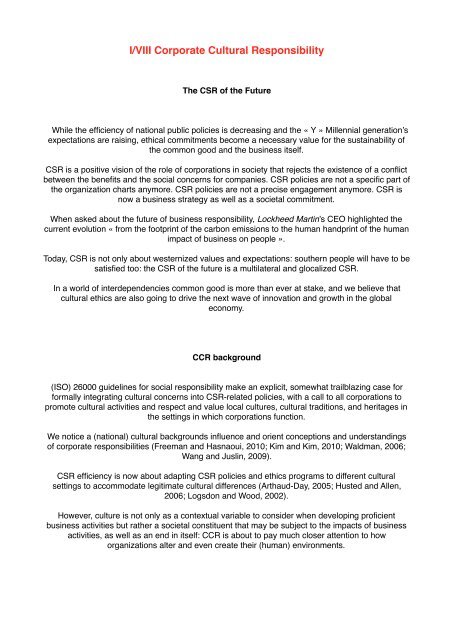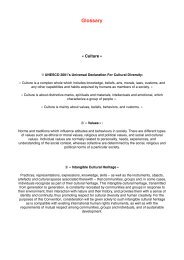Awareness Trainings - Draft #1
Create successful ePaper yourself
Turn your PDF publications into a flip-book with our unique Google optimized e-Paper software.
I/VIII Corporate Cultural Responsibility<br />
The CSR of the Future<br />
While the efficiency of national public policies is decreasing and the « Y » Millennial generation’s<br />
expectations are raising, ethical commitments become a necessary value for the sustainability of<br />
the common good and the business itself.<br />
CSR is a positive vision of the role of corporations in society that rejects the existence of a conflict<br />
between the benefits and the social concerns for companies. CSR policies are not a specific part of<br />
the organization charts anymore. CSR policies are not a precise engagement anymore. CSR is<br />
now a business strategy as well as a societal commitment.<br />
When asked about the future of business responsibility, Lockheed Martin’s CEO highlighted the<br />
current evolution « from the footprint of the carbon emissions to the human handprint of the human<br />
impact of business on people ».<br />
Today, CSR is not only about westernized values and expectations: southern people will have to be<br />
satisfied too: the CSR of the future is a multilateral and glocalized CSR.<br />
In a world of interdependencies common good is more than ever at stake, and we believe that<br />
cultural ethics are also going to drive the next wave of innovation and growth in the global<br />
economy.<br />
CCR background<br />
(ISO) 26000 guidelines for social responsibility make an explicit, somewhat trailblazing case for<br />
formally integrating cultural concerns into CSR-related policies, with a call to all corporations to<br />
promote cultural activities and respect and value local cultures, cultural traditions, and heritages in<br />
the settings in which corporations function.<br />
We notice a (national) cultural backgrounds influence and orient conceptions and understandings<br />
of corporate responsibilities (Freeman and Hasnaoui, 2010; Kim and Kim, 2010; Waldman, 2006;<br />
Wang and Juslin, 2009).<br />
CSR efficiency is now about adapting CSR policies and ethics programs to different cultural<br />
settings to accommodate legitimate cultural differences (Arthaud-Day, 2005; Husted and Allen,<br />
2006; Logsdon and Wood, 2002).<br />
However, culture is not only as a contextual variable to consider when developing proficient<br />
business activities but rather a societal constituent that may be subject to the impacts of business<br />
activities, as well as an end in itself: CCR is about to pay much closer attention to how<br />
organizations alter and even create their (human) environments.




